2020-2021学年高一英语牛津译林版必修第三册Unit 2 Natural disasters Grammar & usage 非谓语动词 课件(共35张PPT)
文档属性
| 名称 | 2020-2021学年高一英语牛津译林版必修第三册Unit 2 Natural disasters Grammar & usage 非谓语动词 课件(共35张PPT) |
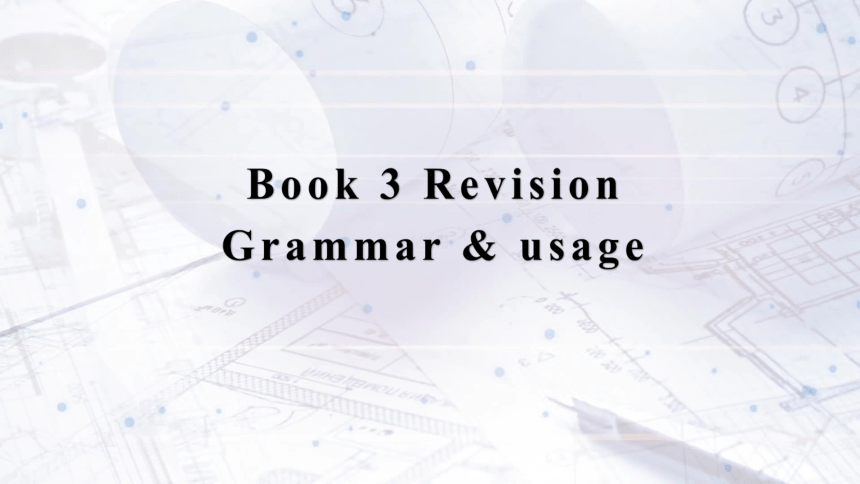
|
|
| 格式 | zip | ||
| 文件大小 | 1.3MB | ||
| 资源类型 | 教案 | ||
| 版本资源 | 牛津译林版(2019) | ||
| 科目 | 英语 | ||
| 更新时间 | 2021-08-16 14:59:18 | ||
图片预览

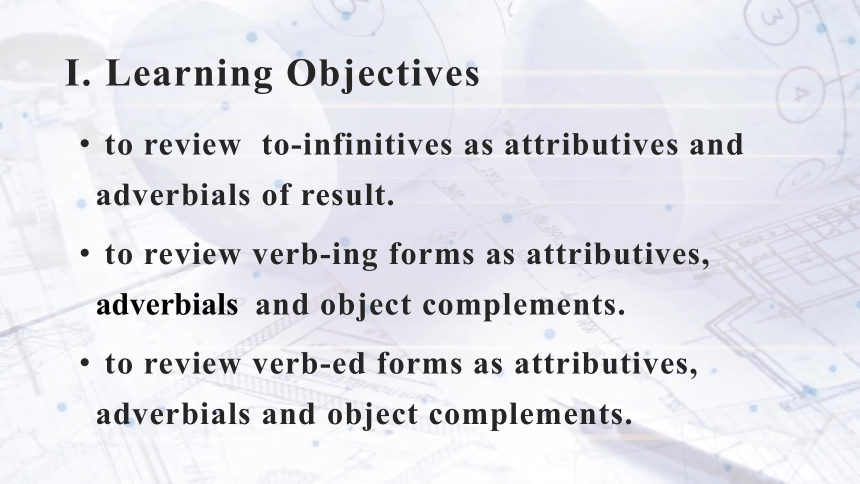
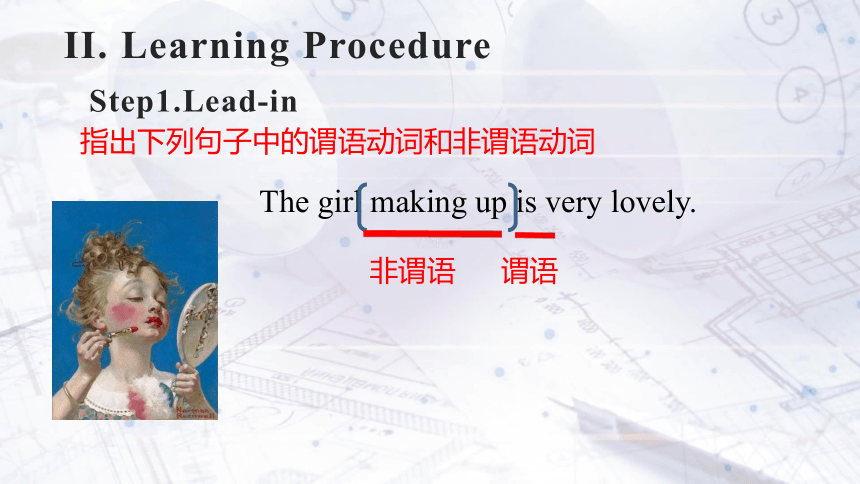
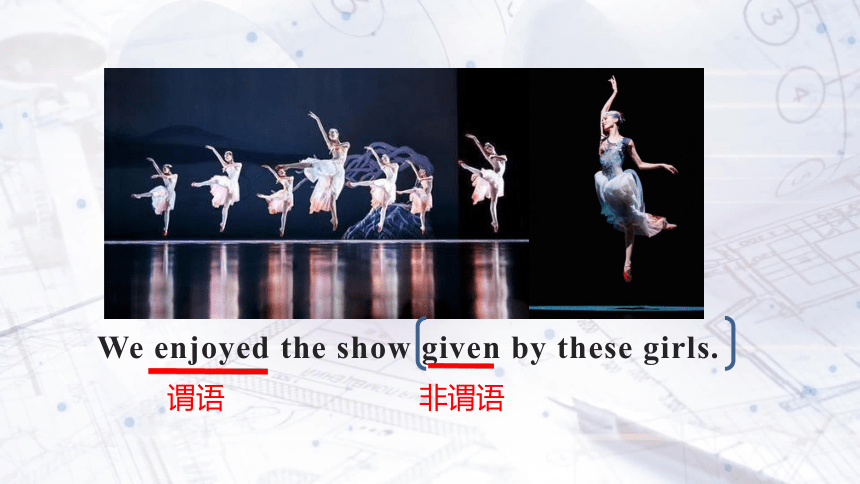
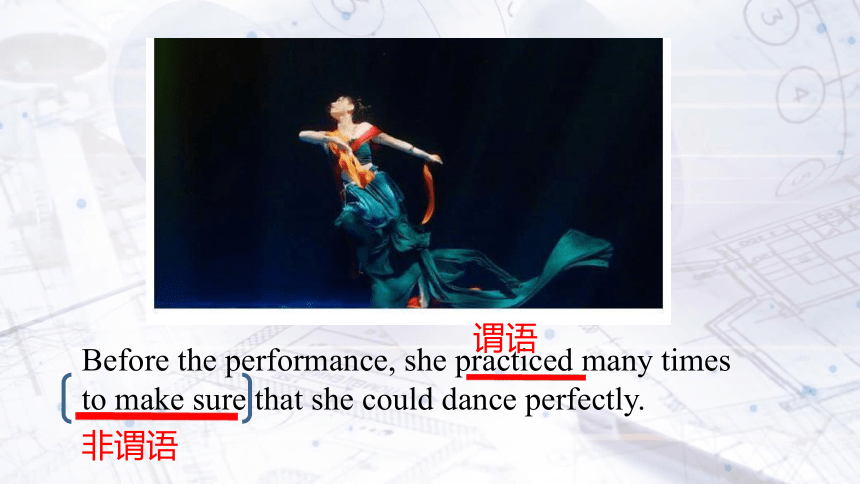


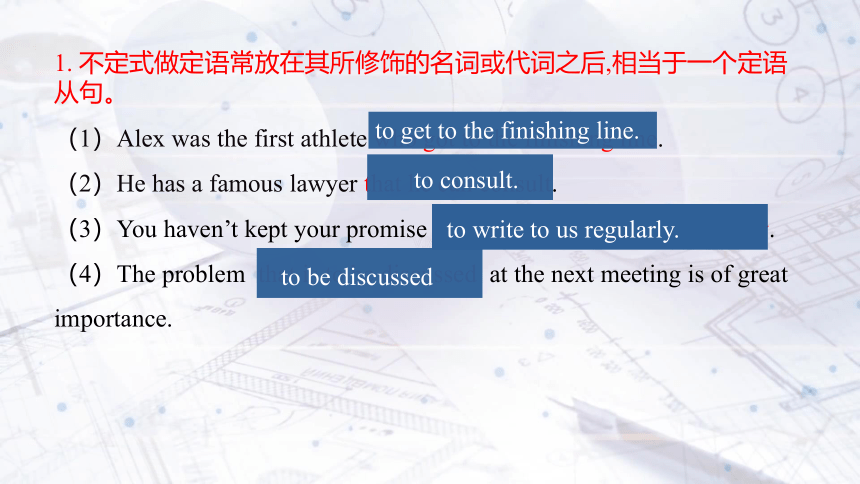
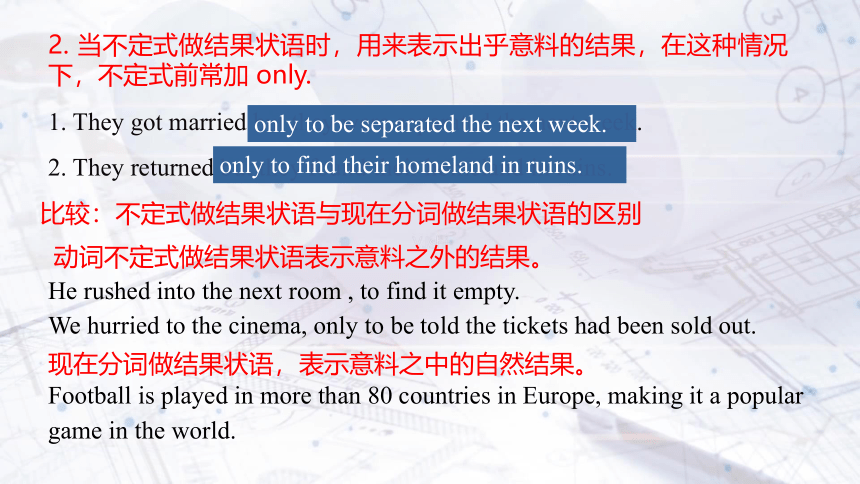
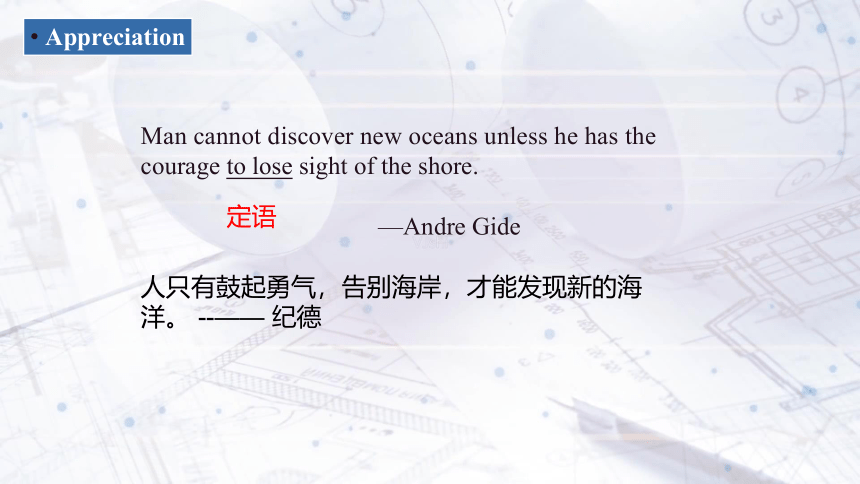

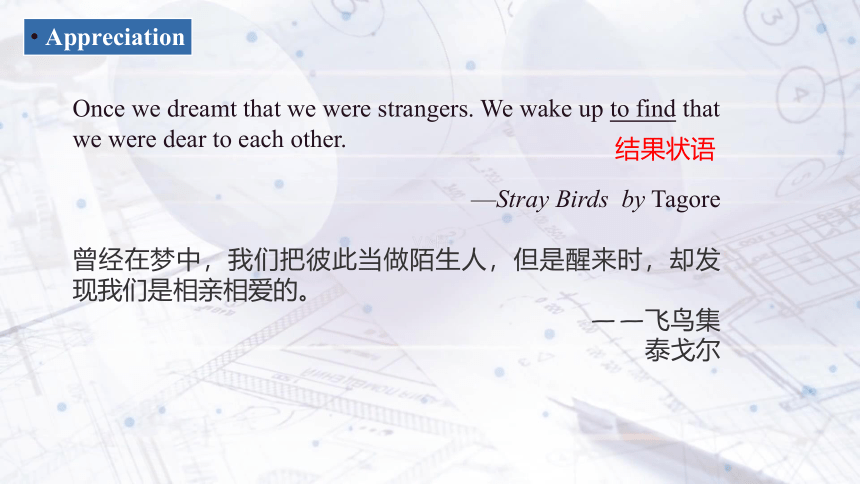
文档简介
(共35张PPT)
Book
3
Revision
Grammar
&
usage
I.
Learning
Objectives
to
review
to-infinitives
as
attributives
and
adverbials
of
result.
to
review
verb-ing
forms
as
attributives,
adverbials
and
object
complements.
to
review
verb-ed
forms
as
attributives,
adverbials
and
object
complements.
II.
Learning
Procedure
Step1.Lead-in
指出下列句子中的谓语动词和非谓语动词
The
girl
making
up
is
very
lovely.
非谓语
谓语
We
enjoyed
the
show
given
by
these
girls.
非谓语
谓语
Before
the
performance,
she
practiced
many
times
to
make
sure
that
she
could
dance
perfectly.
谓语
非谓语
总结:
谓语
动词
非谓语
动词
在句子中充当谓语的动词;
在句子中不充当谓语的动词;
不定式做定语和结果状语
Task1
(1)Alex
was
the
first
athlete
who
got
to
the
finishing
line.
(2)He
has
a
famous
lawyer
that
he
can
consult.
(3)You
haven’t
kept
your
promise
that
you
will
write
to
us
regularly.
(4)The
problem
that
is
to
be
discussed
at
the
next
meeting
is
of
great
importance.
to
get
to
the
finishing
line.
to
consult.
to
write
to
us
regularly.
to
be
discussed
1.
不定式做定语常放在其所修饰的名词或代词之后,相当于一个定语从句。
1.
They
got
married
but
they
were
separated
the
next
week.
2.
They
returned
but
they
found
their
homeland
in
ruins.
only
to
be
separated
the
next
week.
only
to
find
their
homeland
in
ruins.
比较:不定式做结果状语与现在分词做结果状语的区别
He
rushed
into
the
next
room
,
to
find
it
empty.
We
hurried
to
the
cinema,
only
to
be
told
the
tickets
had
been
sold
out.
Football
is
played
in
more
than
80
countries
in
Europe,
making
it
a
popular
game
in
the
world.
2.
当不定式做结果状语时,用来表示出乎意料的结果,在这种情况下,不定式前常加
only.
动词不定式做结果状语表示意料之外的结果。
现在分词做结果状语,表示意料之中的自然结果。
Appreciation
Man
cannot
discover
new
oceans
unless
he
has
the
courage
to
lose
sight
of
the
shore.
—Andre
Gide
人只有鼓起勇气,告别海岸,才能发现新的海洋。
--——
纪德
定语
Appreciation
I
have
nothing
to
offer
but
blood,
toil,
tears
and
sweat.
—Winston
Churchill
我能奉献的没有其它,只有热血、辛劳、眼泪与汗水!
——温斯顿?丘吉尔
定语
Appreciation
Once
we
dreamt
that
we
were
strangers.
We
wake
up
to
find
that
we
were
dear
to
each
other.
—Stray
Birds
by
Tagore
曾经在梦中,我们把彼此当做陌生人,但是醒来时,却发现我们是相亲相爱的。
——飞鸟集
泰戈尔
结果状语
Like
many
people,
Mr
Liu
has
(1)______________________(自己要讲的故事)
about
the
pandemic.
One
morning,
he
got
up
(2)___________________________
(却发现自己发烧了).
Worried,
he
turned
to
the
local
hospital,
(3)______________________(检测呈阳性)
of
the
virus.
With
a
family
(4)_________(raise)
and
a
mountain
of
work
(5)___________
(deal
with),
he
was
at
a
loss
what
(6)_______(do).
Luckily
for
him,
(7)__________________________
(治病的药)
was
readily
available,
and
he
has
a
lot
of
relatives
and
friends
(8)
(支持他).
Now
that
he
has
totally
recovered,
Liu
thinks
there
are
important
lessons
(9)_________(learn)
from
the
pandemic.
“Whatever
your
social
status
is,
however
much
money
you
make,
health
is
always
the
most
important
thing
(10)____________(care
about),”
he
says.
Application
his
own
story
to
tell
only
to
find
himself
having
a
fever
only
to
be
tested
positive
to
raise
to
deal
with
to
do
the
medicine
to
cure
the
disease
to
support
him
to
learn
to
care
about
根据所给提示完成短文
现在分词做定语、状语和宾语补足语
Task2
指出下列句子中的非谓语,并且判断在句中做什么成分
Dancing
on
the
stage
is
my
sister.
Seeing
is
believing.
The
girl
playing
the
violin
is
my
daughter.
I
like
sitting
on
the
sofa
and
eating
snacks.
Seeing
the
girl,
his
face
turns
red.
I
saw
a
man
walking
on
the
roof.
主语
主语
表语
定语
宾语
状语
宾语补足语
(1)
a
crying
baby
(2)
an
exciting
movie
(3)
some
shocking
news
A
verb-ing
form
+
a
noun
(1)
children
sitting
there
(2)
shoes
lying
on
the
floor
(3)the
man
standing
by
the
window
现在分词做定语
单个现在分词放在被修饰词之前,现在分词短语放在被修饰词之后。
a
noun
+
a
verb-ing
phrase
find
the
baby
crying
send
the
papers
flying
in
all
directions
(1)及物动词+宾语+宾补
2.
现在分词做宾语补足语
(2)
with+宾语+现在分词
with
the
boy
leading
the
way
with
the
lamp
burning
(1)
Hearing
the
bad
news,
he
burst
into
tears.
(2)
The
audience
left
the
amphitheater,
still
talking
about
the
performance,
and
soon
disappeared
into
the
darkness.
(3)
The
president
finished
delivering
a
national
address,
adding
that
he
was
willing
to
sacrifice
himself
for
sake
of
the
country
before
he
left
the
stage.
现在分词或现在分词短语做状语时,可以放在句首、句中、句尾,它的逻辑主语与句子的主语一致。
3.现在分词做状语
总结:
1.现在分词在句中通常表示主动和进行的意思;
2.现在分词做定语,常置于所修饰的名词前,现在分词短语做定语常置于所修饰的名词后;
3.用作状语时,现在分词可以表示时间、原因、目的、结果、条件;
4.现在分词也可做宾语补足语
1.
It
rained
heavily
for
several
days,
(cause)
severe
floods
in
the
country.
2.
Suddenly
Mike
saw
a
huge
horse
(run)
towards
him
and
was
frightened
to
scream.
3.
The
issue
(talk
about)
in
their
family
is
very
important
to
them.
4.
Mary
wrote
a
letter
to
her
parents,
(say)
she
missed
them
and
was
studying
hard.
5.
The
salesman
scolded
the
girl
caught
___________(steal)
and
let
her
off.
causing
running
being
talked
about
saying
stealing
宾语补足语
宾语补足语
定语
结果状语
Application
伴随状语
伴随状语
用所给动词的适当形式填空,并判断其在句中所作的成分
6.
They
found
a
dying
old
woman
(lie)
on
the
ground
when
the
door
was
broken
open.
7.
(not
receive)
a
reply,
he
decided
to
send
them
another
email.
8.
After
he
was
elected
president
of
the
company,
he
made
an
(inspire)
speech.
9.
______________(work)
as
a
volunteer
teacher
in
Tibet
for
a
year,
Linda
becomes
more
experienced.
10.
There
are
so
many
troublesome
problems
____________
(remain)
to
be
solved.
lying
Not
having
received
inspiring
Having
worked
remaining
原因状语
原因状语
定语
定语
宾语补足语
过去分词做定语、状语和宾语补足语
Task3
1.过去分词作定语
(1)前置定语
一般情况下,单个过去分词作前置定语,即放在所修饰词之前。
The
polluted
water
was
to
blame
for
the
spread
of
cholera
.
被污染的水造成了霍乱的传播。
The
recovered
animals
will
be
released
soon.
痊愈的动物会很快被释放。
有些过去分词表示特定含义时,单独作定语也可放在所修饰的名词之后,
如left
(剩余的)
given
(所给的)
concerned
(有关的)等。
There
are
few
tigers
left.
It
is
time
for
the
departments
concerned
to
take
measures
to
protect
them
from
dying
out
.
剩余的老虎不多了,是相关部门采取措施保护它们免遭灭绝的时候了。
如果被修饰的词是由every/some/any/no
与thing/body/one所构成的复合代词或指示代词those等,单个分词也放在被修饰词的后面。
Is
there
anything
unsolved?
还有什么没解决的吗?
(2)后置定语
过去分词短语作定语时往往作后置定语,即放在所修饰词之后,它的作用相当于一个定语从句。
Last
Tuesday
in
a
mountainous
area
,
there
were
a
total
of
173
sheep
killed
almost
immediately
(
=
which
were
killed
almost
immediately
)
when
lightning
struck.
上周二在一个山区,
有173只羊在被闪电击中时即刻死亡。
(3)过去分词与现在分词作定语的区别:
语态
时态
被动
主动
完成
进行
形式
意义
过去分词
现在分词
As
we
all
know
,
China
is
a
developing
country
.
The
visitor
came
from
a
developed
country
.
(4)过去分词(done)、现在分词的被动语态(being
done)与动词不定式(to
be
done)作定语的区别:
意义
形式
语态
时态
done
being
done
to
be
done
被动
被动
被动
完成
进行
尚未发生
The
building
built
last
year
is
our
classroom
building.
去年建造的楼是我们的教学楼。
The
building
being
built
now
is
our
classroom
building.
现在正在建造的楼是我们的教学楼。
The
building
to
be
built
next
month
is
our
classroom
building.
下个月将要建造的楼是我们的教学楼。
表被动、完成
表被动、进行
表被动、尚未发生
2.过去分词作状语
过去分词(短语)作状语,表示被动的或完成的动作,
这时句子的主语和过去分词之间为逻辑上的被动关系。
Written
in
a
hurry
,
this
article
was
not
so
good
.
被写、写完
Asked
about
his
address
(
=
When
he
was
asked
about
his
address
)
,
the
boy
didn
'
t
respond
.
Annoyed
at
the
decision
(
=
As
he
was
annoyed
at
the
decision
)
,
he
refused
to
attend
the
meeting
.
Given
more
time
(
=
If
they
were
given
more
time
)
the
trees
could
grow
taller
.
Though
having
been
warned
of
the
storm
(
=
Though
they
had
been
warned
of
the
storm
)
,
the
farmers
were
still
working
in
the
fields.
Followed
by
a
group
of
students
,
the
teacher
entered
the
classroom
.
=
The
teacher
entered
the
classroom
and
he
was
followed
by
a
group
of
students
.
过去分词通常在句中作时间、原因、条件、让步、方式和伴随状语等。
时间状语
原因状语
条件状语
让步状语
方式、伴随状语
注意:
过去分词(短语)作状语时,前面有时可以加上
when
,
if
,
while
,
though
,
even
if
,
until
,
unless等连词
,
这种结构可以看作是一种省略的状语从句(省略部分多为“主语+be的多种形式”)。需要注意的是,省略的主语必须和主句的主语相同或为it。
Even
if
invited
(
=
Even
if
I
'
m
invited
)
,
I
won
'
t
take
part
in
the
party
.
即使受到邀请,我也不会参加那个聚会的。
用所给动词的适当形式填空完成短文
I
tried
the
number?(1)
(print)?in
the
name
card.
A
man
picked
up
the
phone,(2)
(answer)?in
an
anxious
voice.
(explain)
everything,?(4)
(ask)him
to
calm
down,?
(tell)
him
where
I
was,
I
promised
(6)
(wait)for
him.
(7)
(?hear)
my
words,
he
calmed
down
a
little,?
(8)
(thank)me
again
and
again,
(9)
(promise)to
come
immediately
before?
hanging
up?the
phone.
An
hour
later,
I
saw
a
man(10)
(run)?towards
me.
(11)
(recognize)?his
voice,
(12)
(match)?the
information
on
the
name
card,?(13)
(make)
sure?he
was
the
owner,
I
handed
him
the
wallet.
He
thanked
me
again
and
again,
(14)
(hold)
his
thumbs-up,
(15)
(praise)
me,?smiling?happily.?
I
felt
proud
of
myself.
printed
answering
explaining
asking
telling
to
wait
thanking
promising
Having
heard
running
Recognizing
matching
making
holding
praising
untouched
checked
broken
understood
(1)He
got
up
late
and
hurried
to
his
office,
leaving
the
breakfast
(touch).
(2)
Claire
had
her
luggage
(
check
)
an
hour
before
her
plane
left
.
(3)
While
they
were
on
holiday,
they
had
their
car
(break)into.
(4)They
managed
to
make
themselves
(understand)by
using
very
simple
English
.
过去分词做宾语补足语
放在表状态的动词keep,
leave
等后
放在使役动词have\get,
keep和make后
放在see,
hear,
watch,
find,
feel等感官动词后
放在order,wish等表意愿、命令的动词后
用在with的复合结构中
3.
过去分词作宾补
(5)
When
we
saw
the
road
(
block
)with
snow,
we
decided
to
spend
the
holiday
at
home
.
(6)
The
manager
ordered
the
work
(
finish
)
at
the
end
of
this
week
.
(7)
John
received
an
invitation
to
dinner
,
and
with
his
work
(
finish
),
he
gladly
accepted
it
.
blocked
finished
finished
微写作练习
将下面三句话用非谓语动词合并成一句。
Poppy
was
fascinated
by
the
adorable
puppy.
She
stared
at
him
feverishly.
Then
she
bounced
around
with
energy
on
the?soft
pads.?
______________________________________________________________________________________________________________
用with的复合结构合并成一句。
Tears
welled
up
their
eyes.
The
couple
hugged
tightly.
They
promised
not
to
lose
their
temper
and
do
the
silly
thing
again.
______________________________________________________________________________________________________________
Fascinated
by
the
adorable
puppy,
Poppy
stared
at
him
feverishly,
bouncing
around
with
energy
on
the?soft
pads.?
With
tears
welling
up
in
eyes,
the
couple
hugged
tightly,
promising
not
to
lose
their
temper
and
do
the
silly
thing
again.
Book
3
Revision
Grammar
&
usage
I.
Learning
Objectives
to
review
to-infinitives
as
attributives
and
adverbials
of
result.
to
review
verb-ing
forms
as
attributives,
adverbials
and
object
complements.
to
review
verb-ed
forms
as
attributives,
adverbials
and
object
complements.
II.
Learning
Procedure
Step1.Lead-in
指出下列句子中的谓语动词和非谓语动词
The
girl
making
up
is
very
lovely.
非谓语
谓语
We
enjoyed
the
show
given
by
these
girls.
非谓语
谓语
Before
the
performance,
she
practiced
many
times
to
make
sure
that
she
could
dance
perfectly.
谓语
非谓语
总结:
谓语
动词
非谓语
动词
在句子中充当谓语的动词;
在句子中不充当谓语的动词;
不定式做定语和结果状语
Task1
(1)Alex
was
the
first
athlete
who
got
to
the
finishing
line.
(2)He
has
a
famous
lawyer
that
he
can
consult.
(3)You
haven’t
kept
your
promise
that
you
will
write
to
us
regularly.
(4)The
problem
that
is
to
be
discussed
at
the
next
meeting
is
of
great
importance.
to
get
to
the
finishing
line.
to
consult.
to
write
to
us
regularly.
to
be
discussed
1.
不定式做定语常放在其所修饰的名词或代词之后,相当于一个定语从句。
1.
They
got
married
but
they
were
separated
the
next
week.
2.
They
returned
but
they
found
their
homeland
in
ruins.
only
to
be
separated
the
next
week.
only
to
find
their
homeland
in
ruins.
比较:不定式做结果状语与现在分词做结果状语的区别
He
rushed
into
the
next
room
,
to
find
it
empty.
We
hurried
to
the
cinema,
only
to
be
told
the
tickets
had
been
sold
out.
Football
is
played
in
more
than
80
countries
in
Europe,
making
it
a
popular
game
in
the
world.
2.
当不定式做结果状语时,用来表示出乎意料的结果,在这种情况下,不定式前常加
only.
动词不定式做结果状语表示意料之外的结果。
现在分词做结果状语,表示意料之中的自然结果。
Appreciation
Man
cannot
discover
new
oceans
unless
he
has
the
courage
to
lose
sight
of
the
shore.
—Andre
Gide
人只有鼓起勇气,告别海岸,才能发现新的海洋。
--——
纪德
定语
Appreciation
I
have
nothing
to
offer
but
blood,
toil,
tears
and
sweat.
—Winston
Churchill
我能奉献的没有其它,只有热血、辛劳、眼泪与汗水!
——温斯顿?丘吉尔
定语
Appreciation
Once
we
dreamt
that
we
were
strangers.
We
wake
up
to
find
that
we
were
dear
to
each
other.
—Stray
Birds
by
Tagore
曾经在梦中,我们把彼此当做陌生人,但是醒来时,却发现我们是相亲相爱的。
——飞鸟集
泰戈尔
结果状语
Like
many
people,
Mr
Liu
has
(1)______________________(自己要讲的故事)
about
the
pandemic.
One
morning,
he
got
up
(2)___________________________
(却发现自己发烧了).
Worried,
he
turned
to
the
local
hospital,
(3)______________________(检测呈阳性)
of
the
virus.
With
a
family
(4)_________(raise)
and
a
mountain
of
work
(5)___________
(deal
with),
he
was
at
a
loss
what
(6)_______(do).
Luckily
for
him,
(7)__________________________
(治病的药)
was
readily
available,
and
he
has
a
lot
of
relatives
and
friends
(8)
(支持他).
Now
that
he
has
totally
recovered,
Liu
thinks
there
are
important
lessons
(9)_________(learn)
from
the
pandemic.
“Whatever
your
social
status
is,
however
much
money
you
make,
health
is
always
the
most
important
thing
(10)____________(care
about),”
he
says.
Application
his
own
story
to
tell
only
to
find
himself
having
a
fever
only
to
be
tested
positive
to
raise
to
deal
with
to
do
the
medicine
to
cure
the
disease
to
support
him
to
learn
to
care
about
根据所给提示完成短文
现在分词做定语、状语和宾语补足语
Task2
指出下列句子中的非谓语,并且判断在句中做什么成分
Dancing
on
the
stage
is
my
sister.
Seeing
is
believing.
The
girl
playing
the
violin
is
my
daughter.
I
like
sitting
on
the
sofa
and
eating
snacks.
Seeing
the
girl,
his
face
turns
red.
I
saw
a
man
walking
on
the
roof.
主语
主语
表语
定语
宾语
状语
宾语补足语
(1)
a
crying
baby
(2)
an
exciting
movie
(3)
some
shocking
news
A
verb-ing
form
+
a
noun
(1)
children
sitting
there
(2)
shoes
lying
on
the
floor
(3)the
man
standing
by
the
window
现在分词做定语
单个现在分词放在被修饰词之前,现在分词短语放在被修饰词之后。
a
noun
+
a
verb-ing
phrase
find
the
baby
crying
send
the
papers
flying
in
all
directions
(1)及物动词+宾语+宾补
2.
现在分词做宾语补足语
(2)
with+宾语+现在分词
with
the
boy
leading
the
way
with
the
lamp
burning
(1)
Hearing
the
bad
news,
he
burst
into
tears.
(2)
The
audience
left
the
amphitheater,
still
talking
about
the
performance,
and
soon
disappeared
into
the
darkness.
(3)
The
president
finished
delivering
a
national
address,
adding
that
he
was
willing
to
sacrifice
himself
for
sake
of
the
country
before
he
left
the
stage.
现在分词或现在分词短语做状语时,可以放在句首、句中、句尾,它的逻辑主语与句子的主语一致。
3.现在分词做状语
总结:
1.现在分词在句中通常表示主动和进行的意思;
2.现在分词做定语,常置于所修饰的名词前,现在分词短语做定语常置于所修饰的名词后;
3.用作状语时,现在分词可以表示时间、原因、目的、结果、条件;
4.现在分词也可做宾语补足语
1.
It
rained
heavily
for
several
days,
(cause)
severe
floods
in
the
country.
2.
Suddenly
Mike
saw
a
huge
horse
(run)
towards
him
and
was
frightened
to
scream.
3.
The
issue
(talk
about)
in
their
family
is
very
important
to
them.
4.
Mary
wrote
a
letter
to
her
parents,
(say)
she
missed
them
and
was
studying
hard.
5.
The
salesman
scolded
the
girl
caught
___________(steal)
and
let
her
off.
causing
running
being
talked
about
saying
stealing
宾语补足语
宾语补足语
定语
结果状语
Application
伴随状语
伴随状语
用所给动词的适当形式填空,并判断其在句中所作的成分
6.
They
found
a
dying
old
woman
(lie)
on
the
ground
when
the
door
was
broken
open.
7.
(not
receive)
a
reply,
he
decided
to
send
them
another
email.
8.
After
he
was
elected
president
of
the
company,
he
made
an
(inspire)
speech.
9.
______________(work)
as
a
volunteer
teacher
in
Tibet
for
a
year,
Linda
becomes
more
experienced.
10.
There
are
so
many
troublesome
problems
____________
(remain)
to
be
solved.
lying
Not
having
received
inspiring
Having
worked
remaining
原因状语
原因状语
定语
定语
宾语补足语
过去分词做定语、状语和宾语补足语
Task3
1.过去分词作定语
(1)前置定语
一般情况下,单个过去分词作前置定语,即放在所修饰词之前。
The
polluted
water
was
to
blame
for
the
spread
of
cholera
.
被污染的水造成了霍乱的传播。
The
recovered
animals
will
be
released
soon.
痊愈的动物会很快被释放。
有些过去分词表示特定含义时,单独作定语也可放在所修饰的名词之后,
如left
(剩余的)
given
(所给的)
concerned
(有关的)等。
There
are
few
tigers
left.
It
is
time
for
the
departments
concerned
to
take
measures
to
protect
them
from
dying
out
.
剩余的老虎不多了,是相关部门采取措施保护它们免遭灭绝的时候了。
如果被修饰的词是由every/some/any/no
与thing/body/one所构成的复合代词或指示代词those等,单个分词也放在被修饰词的后面。
Is
there
anything
unsolved?
还有什么没解决的吗?
(2)后置定语
过去分词短语作定语时往往作后置定语,即放在所修饰词之后,它的作用相当于一个定语从句。
Last
Tuesday
in
a
mountainous
area
,
there
were
a
total
of
173
sheep
killed
almost
immediately
(
=
which
were
killed
almost
immediately
)
when
lightning
struck.
上周二在一个山区,
有173只羊在被闪电击中时即刻死亡。
(3)过去分词与现在分词作定语的区别:
语态
时态
被动
主动
完成
进行
形式
意义
过去分词
现在分词
As
we
all
know
,
China
is
a
developing
country
.
The
visitor
came
from
a
developed
country
.
(4)过去分词(done)、现在分词的被动语态(being
done)与动词不定式(to
be
done)作定语的区别:
意义
形式
语态
时态
done
being
done
to
be
done
被动
被动
被动
完成
进行
尚未发生
The
building
built
last
year
is
our
classroom
building.
去年建造的楼是我们的教学楼。
The
building
being
built
now
is
our
classroom
building.
现在正在建造的楼是我们的教学楼。
The
building
to
be
built
next
month
is
our
classroom
building.
下个月将要建造的楼是我们的教学楼。
表被动、完成
表被动、进行
表被动、尚未发生
2.过去分词作状语
过去分词(短语)作状语,表示被动的或完成的动作,
这时句子的主语和过去分词之间为逻辑上的被动关系。
Written
in
a
hurry
,
this
article
was
not
so
good
.
被写、写完
Asked
about
his
address
(
=
When
he
was
asked
about
his
address
)
,
the
boy
didn
'
t
respond
.
Annoyed
at
the
decision
(
=
As
he
was
annoyed
at
the
decision
)
,
he
refused
to
attend
the
meeting
.
Given
more
time
(
=
If
they
were
given
more
time
)
the
trees
could
grow
taller
.
Though
having
been
warned
of
the
storm
(
=
Though
they
had
been
warned
of
the
storm
)
,
the
farmers
were
still
working
in
the
fields.
Followed
by
a
group
of
students
,
the
teacher
entered
the
classroom
.
=
The
teacher
entered
the
classroom
and
he
was
followed
by
a
group
of
students
.
过去分词通常在句中作时间、原因、条件、让步、方式和伴随状语等。
时间状语
原因状语
条件状语
让步状语
方式、伴随状语
注意:
过去分词(短语)作状语时,前面有时可以加上
when
,
if
,
while
,
though
,
even
if
,
until
,
unless等连词
,
这种结构可以看作是一种省略的状语从句(省略部分多为“主语+be的多种形式”)。需要注意的是,省略的主语必须和主句的主语相同或为it。
Even
if
invited
(
=
Even
if
I
'
m
invited
)
,
I
won
'
t
take
part
in
the
party
.
即使受到邀请,我也不会参加那个聚会的。
用所给动词的适当形式填空完成短文
I
tried
the
number?(1)
(print)?in
the
name
card.
A
man
picked
up
the
phone,(2)
(answer)?in
an
anxious
voice.
(explain)
everything,?(4)
(ask)him
to
calm
down,?
(tell)
him
where
I
was,
I
promised
(6)
(wait)for
him.
(7)
(?hear)
my
words,
he
calmed
down
a
little,?
(8)
(thank)me
again
and
again,
(9)
(promise)to
come
immediately
before?
hanging
up?the
phone.
An
hour
later,
I
saw
a
man(10)
(run)?towards
me.
(11)
(recognize)?his
voice,
(12)
(match)?the
information
on
the
name
card,?(13)
(make)
sure?he
was
the
owner,
I
handed
him
the
wallet.
He
thanked
me
again
and
again,
(14)
(hold)
his
thumbs-up,
(15)
(praise)
me,?smiling?happily.?
I
felt
proud
of
myself.
printed
answering
explaining
asking
telling
to
wait
thanking
promising
Having
heard
running
Recognizing
matching
making
holding
praising
untouched
checked
broken
understood
(1)He
got
up
late
and
hurried
to
his
office,
leaving
the
breakfast
(touch).
(2)
Claire
had
her
luggage
(
check
)
an
hour
before
her
plane
left
.
(3)
While
they
were
on
holiday,
they
had
their
car
(break)into.
(4)They
managed
to
make
themselves
(understand)by
using
very
simple
English
.
过去分词做宾语补足语
放在表状态的动词keep,
leave
等后
放在使役动词have\get,
keep和make后
放在see,
hear,
watch,
find,
feel等感官动词后
放在order,wish等表意愿、命令的动词后
用在with的复合结构中
3.
过去分词作宾补
(5)
When
we
saw
the
road
(
block
)with
snow,
we
decided
to
spend
the
holiday
at
home
.
(6)
The
manager
ordered
the
work
(
finish
)
at
the
end
of
this
week
.
(7)
John
received
an
invitation
to
dinner
,
and
with
his
work
(
finish
),
he
gladly
accepted
it
.
blocked
finished
finished
微写作练习
将下面三句话用非谓语动词合并成一句。
Poppy
was
fascinated
by
the
adorable
puppy.
She
stared
at
him
feverishly.
Then
she
bounced
around
with
energy
on
the?soft
pads.?
______________________________________________________________________________________________________________
用with的复合结构合并成一句。
Tears
welled
up
their
eyes.
The
couple
hugged
tightly.
They
promised
not
to
lose
their
temper
and
do
the
silly
thing
again.
______________________________________________________________________________________________________________
Fascinated
by
the
adorable
puppy,
Poppy
stared
at
him
feverishly,
bouncing
around
with
energy
on
the?soft
pads.?
With
tears
welling
up
in
eyes,
the
couple
hugged
tightly,
promising
not
to
lose
their
temper
and
do
the
silly
thing
again.
同课章节目录
- Unit 1 Nature in the balance
- Welcome to the unit
- Reading
- Grammar and usage
- Integrated skills
- Extended reading
- Project
- Unit 2 Natural disasters
- Welcome to the unit
- Reading
- Grammar and usage
- Integrated skills
- Extended reading
- Project
- Unit 3 The world online
- Welcome to the unit
- Reading
- Grammar and usage
- Integrated skills
- Extended reading
- Project
- Unit 4 Scientists who changed the world
- Welcome to the unit
- Reading
- Grammar and usage
- Integrated skills
- Extended reading
- Project
